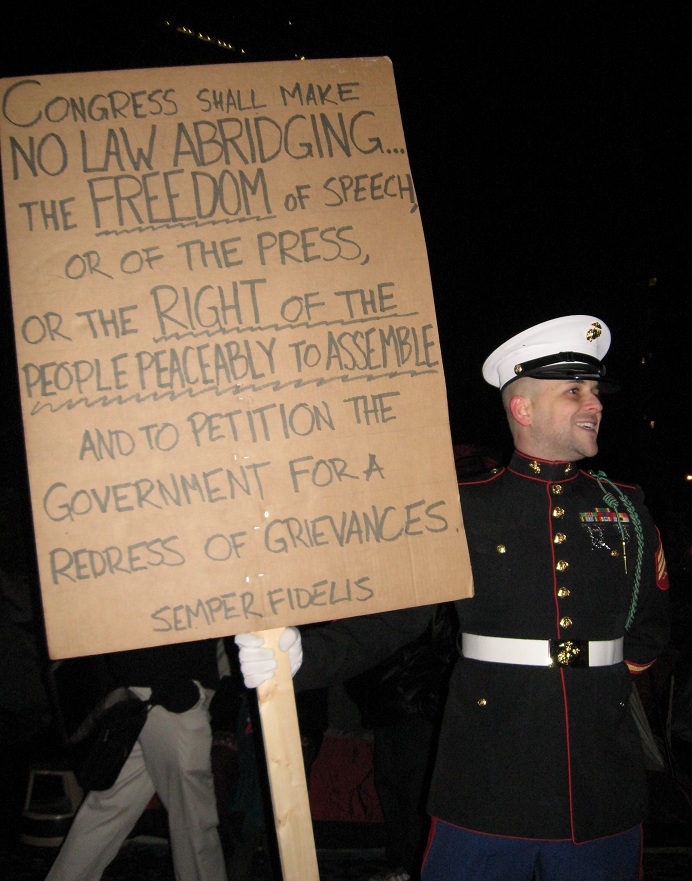From my perch atop a cinderblock near the corner of a Department of Transportation building at midnight Thursday, it should have been obvious that the Boston Police Department would not attempt an eviction of the Occupy Boston encampment in Dewey Square.
At least three hundred people were chanting slogans on the walkway that serves as the stage for Occupy Boston’s general assemblies. At least three hundred more were lining both sides of Atlantic Avenue, dancing and singing to the Second Line Social Aid and Pleasure Society Brass Band. Boston Police officers held one lane open, and trucks earned cheers for blasting their horns as they rolled slowly through.
Uniformed police officers handed out fliers earlier in the evening at the entrance to the camp, informing protesters that anyone in violation of park rules after midnight could face arrest. Mayor Menino announced the deadline to the press. Many within the camp and reporting the news saw the notice as a final warning before an eviction.
As the hour neared 12:00, a small group of the more dedicated Occupy protesters gathered in a corner to prepare a human chain for civil disobedience and arrest. A non-active duty Marine was walking around in dress blues with a large cardboard sign featuring most of the First Amendment and “Semper Fidelis.”
By midnight, the ranks of the protesters had swollen from around 150 to over 1,000. The Boston Police Department’s decision to leave the tents alone was a no-brainer. No good would come from an attempt to remove 55 tents and about 150 occupants from Dewey Square in the middle of a street party more than a thousand strong.
Just after 12:45 a.m., with the crowd at its peak, the band launched into “When the Saints Go Marching In,” and about twenty people began bouncing around to the music in the middle of Atlantic Avenue.
“They’re dancing in the streets!” someone exclaimed in the general assembly area. Within seconds, the ranks closed across the last lane of Atlantic, and giddy protesters drowned out the music with chants of “Whose streets? Our streets!”
Minutes later, BPD Superintendent William Evans confirmed that the police would not move to evict the protesters that night.
“I didn’t think we were gonna win this round,” said Farhad, 33, looking out with a bemused smile on a handful of tents placed defiantly in the street well after 1:00 a.m. He said his job prevents him from living in the camp, but he has been active in Occupy Boston since day one. Hours earlier, as campers removed tents and valuables to avoid destruction by the police, he had explained that he was prepared to stay and “hold,” facing arrest if necessary. Instead, Farhad watched the camp’s central statue of Gandhi occupy Atlantic Avenue for a while.
For protesters, the night felt like a victory. The unanticipated turnout exposed Mayor Menino’s threat as a bluff.
Menino probably does not see it that way. The police flier prompted the removal of about 70% of the tents, according to an estimate by a medic associated with Occupy Boston. While the party cavorted in the street Thursday night, a few Occupy residents went busily on cleaning the camp, removing trash at a slow but steady pace for hours.
There is a core group of Occupy Boston members who seem determined to end their encampment in handcuffs, and as soon as the party dies down, the police will play their final part in the street theater of civil disobedience.
Watching Superintendent Evans’ performance during the street party, the moment of arrest will probably be carried out without incident. Evans personally asked protesters individually to move tents from the middle of Atlantic Avenue back into the park, timing his interventions to have as little inflammatory impact as possible. With light but repeated pressure, he helped turn the group mind against making a stand in the street.
When one Atlantic Avenue occupant refused to leave his tent, Evans quietly cleared the rest of the street first, then slowly pushed the crowd back from the lone tent, eventually making the only prominent arrest of the night.
Menino and the Boston Police Department seem happy to wait for the right moment for the final eviction. Both sides know the script, and when the numbers around Dewey Square are low enough, they will act the scene, avoiding the disruptive influence of a brass band.
Perhaps, now that Boston is one of the highest-profile Occupy encampments nationwide, the recently-evicted campers of New York, Los Angeles, Philadelphia, and elsewhere will hop on a bus to make a final stand in Dewey Square. There were rumors at 3:00 a.m. that a busload from Occupy DC was on its way.
Don’t bet on it. Nationwide, Occupy activists are talking about the elusive next stage of the movement. In Boston, a feeling of finality dominates the camp. Estimates Friday by the Boston Globe put the number of remaining camp residents at only forty. Protesters planning their own arrest may change their minds as the departure of tents and bodies snowballs. Those eager to be arrested alongside fifty others are probably less eager to be arrested alongside only five.
Thursday night was in the low thirties, and windy. The tuba player for the Second Line Social Aid and Pleasure Society Brass Band kept up a bouncing bass line for hours, audible from anywhere in Dewey Square. At 2:40 a.m., a BPD officer and about a dozen protesters found themselves in an informal and friendly discussion about the use of pepper spray against student protesters at UC Davis.
Occupy Boston could be gone in under twenty-four hours, voluntarily or under arrest. However it ends, the play Thursday night was fantastic, with stellar performances by Occupy and the Boston Police Department alike.
